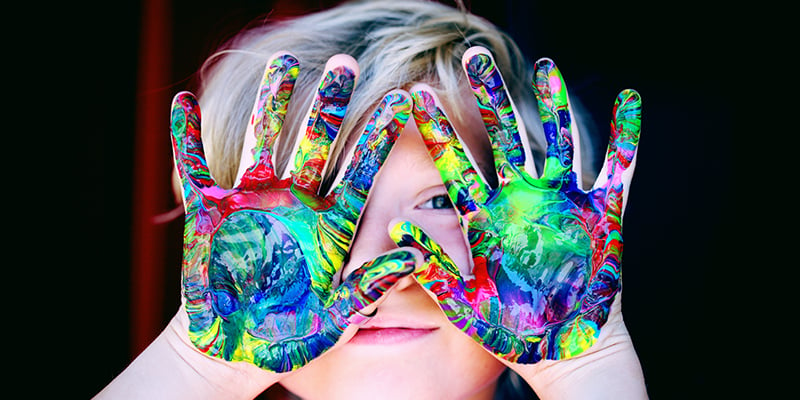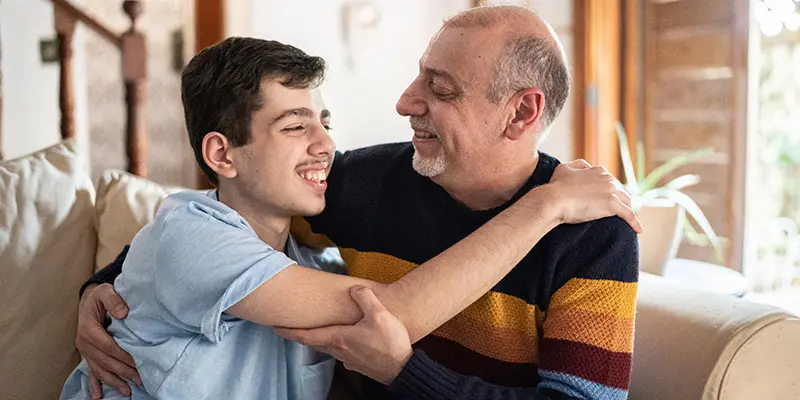
Have you noticed anything about your child’s development or behavior that makes you think your little one might have autism? Maybe they don’t look you in the eye, don’t respond to their name, or don’t smile when you smile at them. These are some of the most common early signs of autism, but there are many more symptoms. Before detailing the many signs of autism, let’s look at some basics of this condition.
WHAT IS AUTISM?
Autism spectrum disorder (ASD) is a developmental disability characterized by differences in social interaction and communication, restricted interests and repetitive behaviors, and often intellectual and language impairments.
As a spectrum disorder, cases can range from mild to severe with varying signs and symptoms. On one end of the spectrum are severe cases of ASD, which often (but not always) involve intellectual impairments. Children and adults with severe ASD may not be able to function independently. On the other end of the spectrum are milder symptoms in those with high-functioning autism (HFA), formerly referred to as Asperger’s syndrome.
Autism is more prevalent today than ever before. According to findings published in JAMA Pediatrics, about 1 in 30 U.S. kids and adolescents had autism in 2020. This represents a shocking 52% increase in autism rates compared with 2017.
To ensure early detection, the American Academy of Pediatrics (AAP) recommends developmental screenings at 9, 18, and 30 months and screening for autism at ages 18 and 24 months. However, despite these efforts, autism continues to be missed. The CDC reports that most children are diagnosed with ASD after age 4, even though autism can be reliably diagnosed as early as age 2. In cases of high-functioning autism (HFA), sometimes the disorder is not recognized until adolescents or adulthood.
The CDC reports that most children are being diagnosed with autism spectrum disorder after age 4, even though autism can be reliably diagnosed as early as age 2. Click To TweetIt’s important for parents to know the signs of autism as parents are more likely to notice developmental deficits than anyone else. Recognition of these early signs can lead to early diagnosis, which can be critical to your child receiving treatment that can help social skills. It’s also necessary to set up an autism-friendly environment to support your child’s ability to meet challenges, according to experts.
WHAT ARE THE SIGNS OF AUTISM SPECTRUM DISORDER?
A child or adult with ASD might exhibit many of the signs or just a few, and signs may change according to gender and age. However, there are a number of core signs observed across the spectrum.
Core Signs of Autism
- Trouble with non-verbal communication (understanding social cues, reading facial expressions and emotions)
- A lack of reciprocal communication
- Stereotypic, repetitive movements, such as rocking or hand flapping
- Strong need for rigid adherence to routines and habits
- Repetitive use of toys/objects, such as always lining up toys
- Resistance to change
- High sensory sensitivity (sounds, smells, etc.)
- Intensely focusing on certain things or subjects
- Repeating words or phrases others say
- Impaired language and speech delays
- Poor eye contact
- Very limited food preferences
- Self-harming behaviors, such as repetitive head-banging, scratching or biting
- Social isolation (especially in older people with ASD who live alone)
Nearly all of the core signs (except for social isolation) can be seen in early ASD, with some additional signs being observed as early as 6 months. Below is a list of the early signs.
Early Signs of Autism
Social
- Difficulty in following objects or events parents are pointing to
- May not point to objects or events to get a parent to look at them
- Less likely to bring objects to show to a parent
- May have odd or out-of-place facial expressions
- Less likely to show concern for or take interest in others
- Has difficulty making and keeping friends
- Not responsive/interested to interactive games like peek-a-boo
Communication
- Failing to respond to name (by 9 months)
- Little to no babbling/chattering or imitating words/sounds
- Doesn’t use hand gestures such as waving goodbye
- Mixes up pronouns (calling self “you” and others “I”)
- Very little interest, if any, in communicating
- Unlikely to initiate or continue a conversation
- Less likely to engage in pretend play, using toys or other objects to represent people or real life
- May exhibit a strong memory, especially for numbers, letters, songs, jingles, or subjects
- The loss of language or other social milestones (between 15 and 24 months)
Behavioral
- May not cry if in pain or show fear
- May have strange use of vision or gaze—looking at an object from odd angles
- Impulsive or aggressive behavior
- Severe temper tantrums
- Disrupted sleep
While this is not an exhaustive list, it does cover many of the most common signs to look for in your infant or young toddler.
DEALING WITH AN AUTISM DIAGNOSIS
For parents, learning your child has autism can be devastating. It’s not unusual to experience feelings of panic, fear, denial, and distress while letting the reality of a diagnosis set in.
One of the major concerns a parent has is worrying if their child will have a full and happy life. Make room for grief and sadness. No one imagines their child will navigate life with ASD. If your child was diagnosed later in life, parents may also experience feelings of remorse around not getting the diagnosis and the right kind of support sooner. It is advised that parents seek the help of a professional or inquire about grief support or an ASD parental support group if needed.
On a brighter note, once parents move into acceptance, a world of opportunity, support, treatment options, and hope begins to open up.
THE UNIQUE ATTRIBUTES OF AUTISM
In time, parents of ASD children discover the unique gifts their children bring to the world. Some might say that these unique differences are “superpowers.”
Focused Concentration
Those with HFA have a strong ability to concentrate. They can develop special interests and devote considerable time and attention to learning about them. Their focused knowledge can lead to careers or experiences that benefit others.
Associative Memory and Visual Learning
Some evidence suggests that HFA children have strong associative memory and visual learning. These attributes tend to create out-of-the-box thinking. One study found that individuals with ASD were able to problem solve an average of 40% faster than individuals with neurotypical brain development due to their enhanced visual processing.
Exhibit Traits for STEM (Science, Tech, and Math) Fields
There’s research from Cambridge University showing that people working in STEM fields have more autistic characteristics than those in other fields, which indicates that people with ASD may be well-suited for careers that require high intellectual functioning. Additionally, another study showed a strong link between child prodigies and ASD traits.
Honest, Accepting, and Reliable
Those with ASD, especially HFA, will nearly always tell you the truth. They see right through pretentious behavior. They tend to be nonjudgmental and lack manipulative behavior and prejudice. They tend to accept people as they are. Those with HFA have a high level of integrity and conscientiousness and are very dependable.
THE POWER OF EARLY DIAGNOSIS IN AUTISM
If you suspect your infant, toddler, or child is exhibiting any of the signs of autism spectrum disorder, reach out to a professional as soon as possible. Early diagnosis is key to getting them the support they need.
Autism spectrum disorder and other mental health disorders can’t wait. At Amen Clinics, we’re here for you. We offer in-clinic brain scanning and appointments, as well as mental telehealth, remote clinical evaluations, and video therapy for adults, children, and couples. Find out more by speaking to a specialist today at 888-288-9834 or visit our contact page here.





Your explanation of ASD offers encouragement to parents and hope for young children. The earlier a child receives relevant therapies, the better he or she will learn necessary skills. I have had a 40 year career in speech and language development, and I am delighted to see what ongoing research has brought to the diagnosis and treatment of ASD.
Comment by Joyce Visnick — August 15, 2022 @ 9:14 AM
I think I say things to people without knowing I said them. People have said angry things to me and I don’t know why.
Comment by Robert R Barela — February 15, 2023 @ 4:32 PM